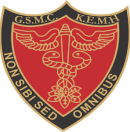

KING EDWARD MEMORIAL HOSPITAL
SETH GORDHANDAS SUNDERDAS MEDICAL COLLEGE
बृहन्मुंबई महानगरपालिका रुग्णालय
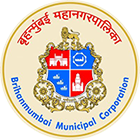


KING EDWARD MEMORIAL HOSPITAL
SETH GORDHANDAS SUNDERDAS MEDICAL COLLEGE
बृहन्मुंबई महानगरपालिका रुग्णालय


A child is not a miniature adult
It was this realization and an interest in improving the then dismal outcomes of children undergoing surgery that led to the separation of paediatric surgery from General Surgery. At that time, in the 1960s, this was certainly a very challenging job. Creation of an entire department from scratch, and building up a complete floor, with a totally self-sufficient super-specialty, to establishment of an MCI-recognised post-graduate course in paediatric surgery, was no small achievement.
Prior to 1967: Humble beginnings
Prior to 1962, all children were admitted and operated in the department of General Surgery. There was no separate Paediatric Surgery ward, ICU or OT. In 1963, a beginning was made in the direction of setting up the specialty, by appointing Dr RK Gandhi as Honorary Lecturer in Paediatric Surgery under Prof. Sen. At that time, 5 beds were given to Dr. Gandhi in ward 5 (in General Surgery), and he started looking after all the paediatric work. Later, the number of beds was increased, and patients were scattered over different wards.
By 1967, these commendable efforts led to Paediatric Surgery becoming firmly entrenched as a separate specialty and a full-fledged department was created by committing all paediatric surgical beds to the care of Dr RKG, who was appointed as Honorary Professor and Head of Paediatric Surgery.
1967: The New Era Begins
Department of Paediatric Surgery was started. Dr RKG was professor and HOD. Dr Snehalata Deshmukh (SSD) was Lecturer. Pediatric Surgery Ward was located above JMT on second floor. Later on additional beds were given in Ward No 2 on ground floor. From 1970, newly created Ward 3 became the ward for paediatric surgical patients. It was built with great efforts on the 3 rd floor terrace of Gynaecology wing (also known as N.A. Purandare wing) just above the postnatal ward (14A). Initially, only 12 beds were allotted, which were gradually increased to 18, then 20, then 24 beds. Now, there are 50 beds allotted to ward 3.
There was no separate dedicated OT and ICU. A small room at the entry of ward was used as a temporary ICU. JMT OT (General Surgery OT on 1st floor) was used for Paediatric Surgery cases till 1982. There was no lift till ward 3. It was only up to the second floor. The only access to ward 3 was via a narrow staircase beside the lift. Patients were physically shifted up and down the staircase as no trolley could be pushed till there.
1972: The Department got recognised for M S (Paediatric Surgery) in April 1972. Paediatric Surgical and Gen Surgical residents were appointed
1973: First MS Paediatric Surgery examination taken.
1980: First batch to enter as MCh Paediatric Surgery batch.
1982: Paediatric Surgery OT Complex, separate Paediatric Surgery ICU (3ICU) and seminar hall were constructed on the terrace beside the existing ward 3.
There were three OTs constructed. Two OTs were used daily for cases under anaesthesia. 3rd OT was used for endoscopies and as septic OT. At this time, the lift was extended to come up to ward 3 on the third floor. The ICU had Omega incubators with trolley. Luschko and Birds were the first ventilators in ICU. Luschko was imported from Amsterdam. At that time, Dr. Anil Tendolkar, from department of cardiovascular surgery, taught the residents how to use the Birds’ ventilator. Right at that time, there was auto door closure system in 3ICU so as to reduce the chances of infection. The entire renovated complex provided a complete setup for management of Paediatric surgical conditions.
1986 The first test tube baby of Mumbai, delivered by Dr Indira Hinduja in KEM hospital, Ms. Harsha Chawda, was kept in this very 3ICU in 1986. She developed acquired rectovestibular fistula which was successfully treated in ward 3 ICU.
2001 Platinum Jubilee Celebrations of Seth GSMC and KEMH
2003 Universal Cystoscope set acquired by department in 2003
First Single chip Laparoscopy Set acquired by department in 2004
2006 Thoracoscopy Set
2008 Triple Chip CCD Camera
2009 Harmonic Scalpel
HD Laparoscopy set
MUHS Recognised 1 year Fellowship in Paediatric Minimal Access Surgery Started. Dr Rahulkumar Gupta was the first fellow. Till today, 8 candidates have been awarded fellowship.
2010 High Frequency Oscillatory Ventilator (HFOV)
2011 Ventilating Bronchoscope
Best OT Award
2011 Renovated Ward 3, ICU and OT complex
2013 Birth Defect Clinic
2004 single chip laparoscopy set acquired
2009 Number of fellows in laparoscopic surgery MIS: 11
2018 Holmium Laser acquired for laser treatment of posterior urethral valves, bladder and ureteric calculi, stricture urethra. More than 100 laser procedures done till date
2013 BDC families counselled: 4655 till date
2016 number of 3D lap surgeries: 365 till date
2023: Acquisition of Paediatric 4K Videoendourology set (4K laparoscopy set and ureterorenoscope) through donation by Members of Parliament Local Area Development (MPLAD) fund
New Flexible Upper GI scope Balloon dilatation
Paediatric Urology Set With Ureteroscope
Endoscopic Management Of Vesicoureteric Reflux
2016
2017
Modular OT
Visit of Director (ME & MH) to inspect modular OT
Holmium YAG laser for paediatric use
Conferences arranged by Department
Dr. Sandesh V. Parelkar
M.S.(General Surgery); M.Ch.(Paediatric Surgery)
Professor & Head
Dr. Beejal Sanghvi
MS MCh (Ped surg) DNB (Ped surg)
Professor.
Dr. Rahulkumar Gupta
M.Ch Pediatric Surgery
Additional Professor
Dr. Kedar Mudkhedkar
M.Ch Pediatric Surgery
Associate Professor
Dr. Deepa Makhija
M.Ch Pediatric Surgery
Assistant Professor
Dr. Rujuta Shah
M.Ch Pediatric Surgery
Assistant Professor
Postgraduate students :
Dr. Pooja Tiwari- S.S.M.O
Dr. Kavimozhy Illakiya SR III
Dr. Manish Khobraghade SR II
Dr. Ashutosh Sharma- SR II
Dr Kamalkant Sharma SR I
Dr Soundarya S SR I
Dr Manish Nehal SR
Residents
Dr Mahendra Dandge SR III
Dr Sonal Malviya SR III
The department of Paediatric Surgery has a ward with a capacity of 50 beds – including an eight-bed intensive care unit and a dedicated operation theatre complex with an endoscopy room. The department deals with a wide spectrum of cases below the age of twelve years.
Both emergency and elective cases are seen; the referrals being from private practitioners, school health clinics, outpatient clinics, peripheral primary and secondary health care centres and from the Departments of Paediatrics and Neonatology. Regional patients form neighbouring states are also treated in the department.
The department provides emergency services daily with residents available on the floor round the clock. The department runs out patient clinics twice a week on Tuesday and Thursday at 1:30pm in OPD 11 on the ground floor Multistory Building. Every Thursday at 2.30 pm, a speciality multi-disciplinary Birth defect Clinic has been started , where couples with antenatal scan showing anomalies are jointly counseled.
The department runs two operation theatres five days a week. The total surgeries performed annually are about 2000; 800 of which are major operations. Routine upper G. I. Endoscopies, bronchoscopies and cystoscopies are done regularly.
Division of Paediatric Surgery covers a wide area of work namely :
Every Thursday at 2.30 pm a speciality Birth defect Clinic is conducted; where all children with any congenital anomaly, pregnant ladies with antenatal USG showing fetus with congenital anomalies, ladies with bad obstetric history and also couples with family history of birth defect are seen in the clinic. The specialists from respective speciality have a joint consultation, outline management plan and counsel the children alongwith their families in this clinic. More than 300 families have attended the clinic.The clinic is conducted every Thursday afternoon at 2.30 pm in the Board Room, Department of Paediatric Surgery, 3rd Floor, Old building, Gynecology Wing, K.E.M. Hospital.
The special 8 bedded ICU provides much needed postoperative care to neonates, infants and children who need ventilation and/or ICU care. The department possesses a high frequency oscillatory ventilator system for ventilation of newborn children with congenital diaphragmatic hernia and pulmonary hypertension and adequate warmers and multipara monitors.
The department runs a superspecialty M. Ch. course in Paediatric Surgery for which post-MS or post-DNB General Surgery candidates are enrolled every year (recognized by Medical Council of India (MCI) and Maharashtra University Of Health sciences[MUHS]). The department undertakes teaching of undergraduate and postgraduate students. A specialised paediatric surgical and general nurses’ training is also undertaken.
The department has a well equipped library with all standard reference books, video cassettes, ebooks and slides. Journal Club is regularly conducted.
The department has an independent seminar hall and conducts regular clinical meetings, which are attended by surgeons from many hospitals in Mumbai.
Research work carried out by the department includes publication and analysis of rare case reports and other articles in international journals.
We have started fellowship in minimal access surgery in pediatric surgery, a 1-year course recognised by MUHS, for 2 candidates per year post M. Ch or DNB in pediatric surgery. Till date, 8 fellows have already been trained; 2 further are undergoing their fellowship.
The department of Paediatric surgery at Seth G S Medical College and K. E. M. Hospital over the years has achieved a high degree of sophistication under the ever watchful eyes of Dr. S.V.Parelkar (Professor and Head) and his team. This is mainly based on
Training of pediatric surgeons in minimal invasive surgery through the MUHS conducted fellowship. Advanced laparoscopic and thoracoscopic surgeries will be aided by latest acquisition of 3 – D Laparoscope.
There has been a changing trend in the field of Paediatric surgery with Minimally Invasive Surgery playing a bigger role in the management of surgery of children. Instrumentation is improving and also the skills need to be acquired and augmented to enable safe surgery through a laparoscope in smaller babies, even neonates.
Both thoracic and abdominal ailments are being treated by minimal invasive surgery and a wide range of basic and advanced surgical procedures are being carried out from newboens till 12 years age.
“NEW ERA” of widespread screening of the unborn child by ultrasound (USG) with planned intrauterine, intrapartum and immediate postpartum interventions. With the development of sophisticated ultrasonographic imaging and fetal sampling techniques, a growing number of fetal disorders are amenable to surgical manipulation. This is undertaken at a very few selective centres.
With the widespread availability of robotic surgical systems, it is natural for advanced paediatric surgical reconstructive surgeries to be carried out by using such systems. The department plans to procure a robot for all such procedures which will greatly benefit these children.
The department has performed bilateral Laparoscopic cortex sparing adrenelectomy for pheochromocytoma with von-Hippel-Lindau syndrome in 10yr boy.Aim was to save the adrenal cortex and avoid addisonian state in the child .
Laparosocpic management of retrocaval ureter with uretero – ureteric anastomosis. Normally this surgery would need a large vertical midline incision.
Whipples pancreatico duodenonectomy with bilateral adrenelectomy for pancreatric neruro ectodermal tumor with bilateral phaeochromocytoma
Distal splenorenal shunt for portal hypertension.
The department has recently successfully performed a laparoscopic partial splenectomy in a 10 year girl with a benign splenic cyst. clinically a mobile lump in the LHC 10x8cm was palpable. USG and CT were suggestive of a splenic cyst with peripheral calcification arising from the lower pole. Laparoscopy was done under GA in supine position with 4 ports. the lower polar vessels were clipped and a good line of demarcation had formed. We then used the harmonic scalpel to divide the spleen along the line of demarcation and removed the specimen through a small pfannensteil incision. The histopathology came as epidermoid cyst. Patient had an uneventful recovery.
The department has successfully performed thoracoscopic repairs of congenital diaphragmatic hernia and eventration of diaphragm.The youngest child was 15 days old and the oldest 1.5 years.
We have recently done a retroperitoneoscopic nephrectomy for a non-functioning kidney secondary to pelvi-ureteric obstruction in a six-year-old boy. It was done with the patient in the prone position with only 2 ports – one for the camera and the other for the instrument port. This is a relatively new technique, SIMPL stands for Single Instrument Port Laparoscopy. Thus the entire procedure is done through only one working port and there are only 2 small incisions on the back.
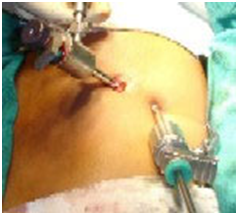 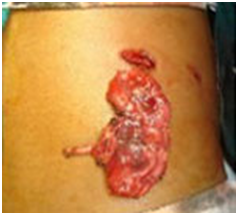 |
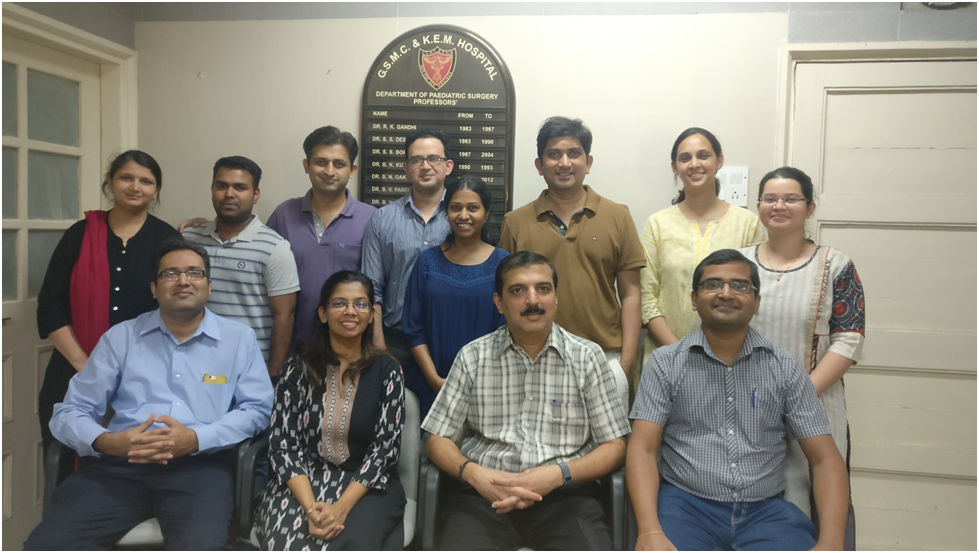
Sitting: Dr B V Sanghvi, Dr S V Parelkar, Dr R K Gupta, Dr K P Mudkhedkar
Standing: Dr Manish Khobragade, Dr Akhilram, Dr Pooja Tiwari, Dr Saundarya, Dr Rujuta Shah, Dr Kavimozhy, Dr Kamal Sharma, Dr Ashutosh Sharma
Photos of golden jubilee celebrations 16-12-2017
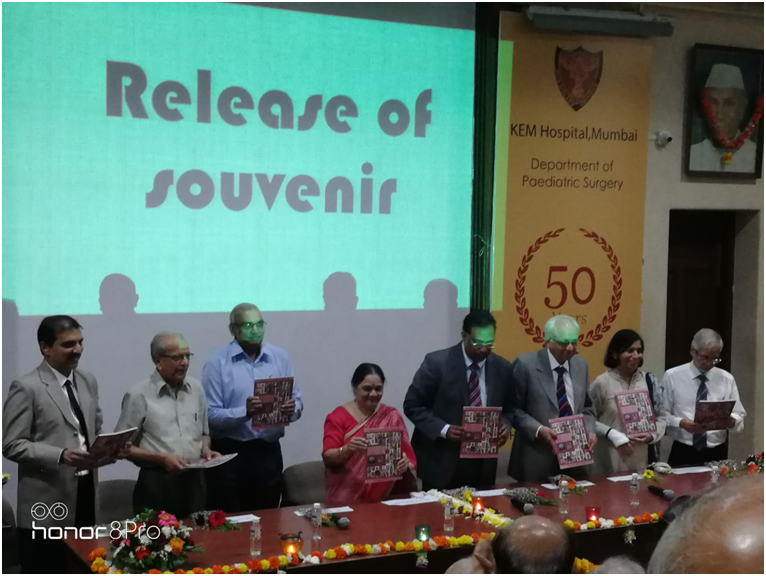
Department of Paediatric Surgery
Seth G.S.Medical College & K.E.M.Hospital, Parel,
Mumbai-400 012, Maharashtra India.
Tel: 0091-22-2413 6051 Ext:2220
Fax:0091-22-2414 3435
Email : websitecontact@kem.edu
MIS: 3286 total. Recently 4K laparoscopy system has been acquired also.
Add below it Laser as new point 8: Holmium Laser for laser treatment of posterior urethral valves, bladder and ureteric calculi, stricture urethra. More than 100 laser procedures done
Others, current activities. Diaphragmatic hernia-age from newborn to 13 years, including newborns on ventilators
Education: daily counselling of all ICU patients relatives, detailed counselling to admitted patients, detailed education about disease awith emphasis on treatment and follow up for all chronic conditions like posterior urethral valves, VUR, BOO, neurogenic bladder, anorectal malformations, esophageal atresia, diaphragmatic hernia, etc
Anjeze trust: weekly counsel patient regarding hygiene
Academic courses
MCh in pediatric surgery-3 year superspecialty course
Fellowship in Minimal Access in Pediatric Surgery-1 year MUHS recognised fellowship
Teaching schedule:
Weekly case presentation
Every Saturday- grand round,
Monthly journal club
Daily teaching in OT, in OPD and on ward rounds
Faculty:
Dr. Susmita Bhatnagar- Professor
Dr. Pradnya Bendre- Professor
Dr. Suyodhan Reddy- Additional Professor
Dr. Parag Karkera- Associate Professor
Dr. Flavia Dsouza- Assistant Professor
Dr. Gayatri Munghate- Assistant Professor
|
Name |
Designation |
Date of Joining
|
MMC Registration | |
| As faculty | As current designation | |||
|
Dr. Susmita Bhatnagar |
Professor (Teacher )
|
January 2001 | 20/07/2011 | 66375 |
|
Dr. Pradnya Bendre |
Professor
( Teacher )
|
14.06.2003 | 17/9/2012 | 61920 |
|
Dr. Suyodhan Reddy |
Additional Professor
( Teacher )
|
01.01.2013 | 01.01.2016 | 81943 |
|
Dr. Parag Karkera |
Associate Professor
|
01.04.2013 | 19..05.2016 | 2003031514 |
| Dr. Flavia Dsouza | Assistant Professor | 03.07.2015 | 03.07.2015 | 2006042328 |
| Dr. Gayatri Munghate | Assistant Professor | 20.05.2016 | 20.05.2016 | 2000031553 |
Postgraduate students:
Dr. Amol Nage – Post Mch Registrar
Dr. Uttam Rawate – SR II
Dr. Praveen Raju – Jr Reg
Dr. Ajraj Mishra- Jr Reg
| Sr.No. | Date | Case
|
Presented by | Teaching faculty |
| 01/06/2017 | Biliary Atresia | Dr.Kavimozhi Illakiya | Dr SVP, Dr BVS,
Dr RKG, Dr KPM |
|
| 02/06/2017 | Pelvi-ureteric junction
|
Dr. Manish Khobragade | Dr SVP, Dr BVS,
Dr RKG, Dr KPM
|
|
| 03/06/2017 | Embryology & Surgical anatomy of esophagus
|
Dr.Kavimozhi Illakiya | Dr SVP, Dr BVS,
Dr RKG, Dr KPM |
|
| 05/06/2017 | Epidemiology, Clinical features & diagnosis of Tracheo Esophageal fistula | Dr. Manish Khobragade | Dr SVP, Dr BVS,
Dr RKG, Dr KPM |
|
| 10/06/2017 | Management of Tracheo-esophageal fistula | Dr.Kavimozhi Illakiya | Dr SVP, Dr BVS,
Dr RKG, Dr KPM |
|
| 12/06/2017 | Esophageal perforation and strictures
|
Dr.Sonali Mane | Dr SVP, Dr BVS,
Dr RKG, Dr KPM |
|
| 14/06/2017 | Gastro Esophageal Reflux Disease: Clinical features & investigations
|
Dr.Pooja Tiwari | Dr SVP, Dr BVS,
Dr RKG, Dr KPM |
|
| 17/06/2017 | Gastro Esophageal Reflux Disease: Etiology & pathogenesis.
|
Dr.Kavimozhi Illakiya | Dr SVP, Dr BVS,
Dr RKG, Dr KPM |
|
| 19/06/2017 | Esophageal replacement procedures
|
Dr.Kavimozhi Illakiya | Dr SVP, Dr BVS,
Dr RKG, Dr KPM |
|
| 21/06/2017 | Unusual variants of Tracheo-esophageal fistula
|
Dr. Ashutosh Sharma | Dr SVP, Dr BVS,
Dr RKG, Dr KPM |
|
| 24/06/2017 | Intestinal Obstruction
|
Dr. Ashutosh Sharma | Dr SVP, Dr BVS,
Dr RKG, Dr KPM |
|
| 28/06/2017 | Wilm’s tumour | Dr.Kavimozhi Illakiya | Dr SVP, Dr BVS,
Dr RKG, Dr KPM |
|
| 01/07/2017 | Male ARM | Dr. Rujuta Shah | Dr SVP, Dr BVS,
Dr RKG, Dr KPM |
|
| 03/07/2017 | PU valve
|
Dr.Kavimozhi Illakiya | Dr SVP, Dr BVS,
Dr RKG, Dr KPM |
|
| 05/07/2017 | Hirschprung’s disease | Dr.Sonali Mane | Dr SVP, Dr BVS,
Dr RKG, Dr KPM |
|
| 07/07/2017 | Female ARM
|
Dr.Pooja Tiwari | Dr SVP, Dr BVS,
Dr RKG, Dr KPM |
|
| 08/07/2017 | Hydrocephalus
|
Dr.Sonali Mane | Dr SVP, Dr BVS,
Dr RKG, Dr KPM |
|
| 10/07/2017 | Biliary atresia
|
Dr.Pooja Tiwari | Dr SVP, Dr BVS,
Dr RKG, Dr KPM |
|
| 11/07/2017 | Lumbar MMC | Dr.Sonali Mane | Dr SVP, Dr BVS,
Dr RKG, Dr KPM |
|
| 17/07/2017 | Cystic hygroma neck
|
Dr.Pooja Tiwari | Dr SVP, Dr BVS,
Dr RKG, Dr KPM |
|
| 19/07/2017 | Thyroglossal cyst
|
Dr.Sonali Mane | Dr SVP, Dr BVS,
Dr RKG, Dr KPM |
|
| 22/07/2017 | Morrant Baker’s cyst
|
Dr.Pooja Tiwari | Dr SVP, Dr BVS,
Dr RKG, Dr KPM |
|
| 24/07/2017 | Branchial sinus | Dr. Manish Khobragade | Dr SVP, Dr BVS,
Dr RKG, Dr KPM |
|
| 28/07/2017 | Male ARM
|
Dr.Sonali Mane | Dr SVP, Dr BVS,
Dr RKG, Dr KPM |
|
| 29/07/2017 | Neuroblastoma
|
Dr. Rujuta Shah | Dr SVP, Dr BVS,
Dr RKG, Dr KPM |
|
| 31/07/2017 | Hirschprung’s disease
|
Dr.Pooja Tiwari | Dr SVP, Dr BVS,
Dr RKG, Dr KPM |
| PRESENTER-YR | CASES | FACULTY | |
| 3 YR SNB | Neuroblastom a | SNB | |
| 3 RD YEAR PSB | MALE ARM | PSB | |
| 3 YR SNB | FEMALE ARM | PSB | |
| 3 RD YEAR PSB | HIRSCHSPRUNGS DISE A S E | PSB | |
| 3 YR SNB | NEUROGENIC BLADDER | SNB | |
| 3 RD YEAR PSB | PU VALVES | SSB | |
| 3 YR SNB | BLADDER EXTROPHY | PSB | |
| 3 RD YEAR PSB | HYPOSPADIAS | SR | |
| 3 YR SNB | DSD | REGE | |
| 3 RD YEAR PSB | DSD | SARITA | |
| 3 YR SNB | DSD | PSB | |
| 3 RD YEAR PSB | PUJ | PSB | |
| 3 YR SNB | NECK SWELLINGS | PK | |
| 3 RD YEAR PSB | UDT (PALPABLE) | SR | |
| 3 YR SNB | UDT (NON-PALPABLE) | SR | |
| 3 RD YEAR PSB | Wilms tumor | SNB | |
| 3 YR SNB | MMC | SUYODHAN | |
| 3 RD YEAR PSB | OBSTRUCTIVE JAUNDICE | SNB | |
| 3 YR SNB | HYDROCEPHALUS | PARAG | |
| 3 RD YEAR PSB | LUMPS & BUMPS (Cystic hygroma, thyroglossal cystbranchealsinus/HAEMANGIOMAS) | PARAG | |
| 3 YR SNB | HERNIA & PHIMOSIS | PARAG | |
| SEMINARS/SYMPOSIA/GUEST LECTURES/JOURNAL CLUB | |||
| SYMPOSIUM | 2 YR SNB | EXTROPHY BLADDER | PSB |
| SYMPOSIUM | 2 YR SNB | Nano techanology | SNB |
| SYMPOSIUM | 2 RD YEAR PSB | GER | REDKAR/AMDEKAR SIR/JMK |
| SYMPOSIUM | 2YR SNB | Robotics | SR |
| SYMPOSIUM | 2 RD YEAR PSB | ABDOMINAL WALL DEFECTS | SNB |
| SYMPOSIUM | 2YR SNB | Tissue Engineering | PARAG |
| SYMPOSIUM WITH JOURNAL | 2 RD YEAR PSB | VUR T/T & Controversies | PSB/SARITA |
| SYMPOSIUM WITH JOURNAL | 2 YR SNB | Obstructing Mega ureter | PSB |
| SYMPOSIUM | 2 RD YEAR PSB | Lasers in pediatric surgery | PARAG |
| SYMPOSIUM | 2 YR SNB | Nano technology | PARAG |
| LECTURER-INTERACTIVE WITH CASE SCENARIOS | 2 RD YEAR PSB | Fetal surgery/intervention | SR/PK |
| LECTURER-INTERACTIVE WITH CASE SCENARIOS | 2 YR SNB | Recent adv. In diag.& T/T of neuroblastoma | SNB/ARCHANA SWAMI |
| SYMPOSIUM WITH JOURNAL | 2 RD YEAR PSB | Controversies in management of enteric nervous system disorders | SARITA/PSB |
| LECTURER-INTERACTIVE WITH CASE SCENARIOS | 2 YR SNB | RENAL SCANS | AVNISH SHARMA |
| OTHER ISOTOP SCASNS | AVNISH SHARMA | ||
| SYMPOSIUM & JOURNAL | 2 YR SNB | CDH | SUDHA/SURG |
| LECTURER-INTERACTIVE WITH CASE SCENARIOS | 2 RD YEAR PSB | MRI | SAROJ CHAVAN |
| LECTURER-INTERACTIVE WITH CASE SCENARIOS | CT | SAROJ CHAVAN | |
| LECTURER-INTERACTIVE WITH CASE SCENARIOS | 2 YR SNB | Ventilator-high frequency | LAXMI |
| LECTURER-INTERACTIVE | 2 RD YEAR PSB | Fluid & Electrolyte & Anti-biotics | LAXMI |
| LECTURER-INTERACTIVE WITH CASE SCENARIOS | 2 YR SNB | Fluid Mang. ( IHPS Gastro schisis, Burns ) | PARAG & LAXMI |
| LECTURER-INTERACTIVE WITH CASE SCENARIOS | 2 RD YEAR PSB | Bowel washes, enemas & dye studies | DR NADKARNI |
| LECTURE INTERACTINE | 2 YR SNB | Jaundice | IRA SHAH |
| LECTURE INTERACTIVE | 2 RD YEAR PSB | Neonatal Exam., Jaundice, Photo therapy &Sclerema. | SUDHA RAO/VAIDEHI |
| LECTURE INTERACTIVE | 2 YR SNB | Mang. Of Shock, Rescucitation in Neonates &Children,septic shock-PALS GUIDELINES | Dr. ALPANA UTTURE/PALAH |
| SYMPOSIUM | 2 RD YEAR PSB | Stem cell therapy | MUKESH DESAI |
| 2YR SNB | PersistantFoetal (.) &mang. Of Pulm. HTN | Dr. S S PRABHU | |
| LECTURER-INTERACTIVE WITH CASE SCENARIOS | 2 RD YEAR PSB | Mang. Of Raised ICT/ Blocked Shunts | Dr. BIYANI |
| Rescucation in trauma | Dr. | ||
| INTERACTIVE LECTURE | 2RD YEAR PSB | ACID BASE BALANCE | UMA ALI |
1st Friday-case presentation2nd Friday –radiology meet/case presentation
3rd Friday –case presentation
4th Friday –case presentation
1ST– Saturday- grand round,
2nd–Saturday- guest lecture
3rd–Saturday symposium,
4th–Saturday journal club
Resident –presenter is responsible for organization should contact coordinator 1 wk before activity .involved faculty or resident should contact coordinator if they need any adjustment.
Copies of journals to be emailed to all 1 wk in advance.
Attendance is mandatory to residents.
Faculties are encouraged & appreciated for participation.